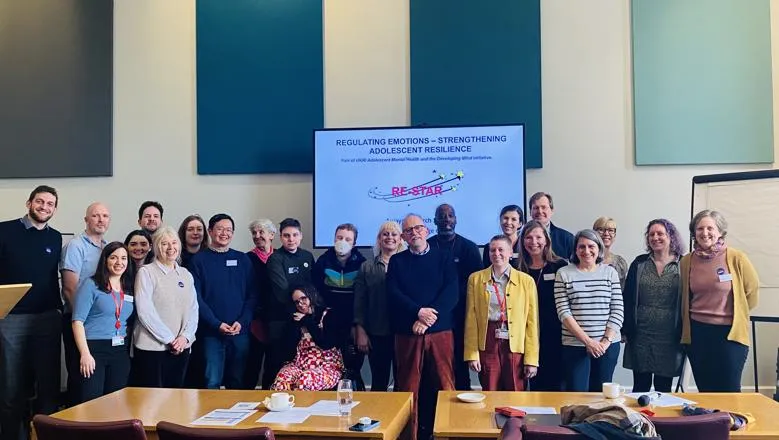-

Project Coordinator
-

Senior Clinical Lecturer
-

Research Associate
-

-

Postdoctoral Research Fellow & RE-STAR Programme Manager
-

Professor of Child & Adolescent Psychiatry
-

-

Postdoctoral Research Associate
-

Research Worker
-

Senior Clinical Lecturer
-

Research Assistant
-

Research Fellow
-

OPTIMA Research Administrator
-

Trainee Clinical Psychologist
-

Clinical Lecturer
-

Executive Assistant to the Head of Department
-

Post-doctoral Research Associate
-

Clinical Reader
-

Trainee Clinical Psychologist
-

Postdoctoral Research Associate
-

Research Assistant
-

Research Associate
-

Professor of Neurodevelopment & Mental Health
-

Senior Research Support Officer
-

Visiting Professor
-

Postdoctoral Research Associate
-

Research Assistant
-

PhD student
-

PhD Student
-

Professor of Cognitive Neuroscience
-

Senior Clinical Lecturer
-

Professor of Developmental Neuropsychiatry and Psychopharmacology
-

Professor and Consultant Child and Adolescent Psychiatrist
-

Director, King’s Maudsley Partnership for Children and Young People
-

Professor of Child and Adolescent Psychiatry
-

Professor of Developmental Psychology, Psychiatry and Neuroscience
Click here for a full list of people associated with this department
ACORN is a multidisciplinary group focused on improving outcomes for young people through clinical research that advances early detection, prevention, and intervention in adolescents with mental health difficulties.
Gen2020 researchers will map the potential impact of prenatal exposures such as Covid-19 on fetal and childhood brain development and outcomes.
CIPPRT is a team focused on medication-related suicidality, development of Patient Center Outcome Measures (PCOMs), as well as rare diseases such as Rett syndrome and mucopolysaccharidoses (MPS) syndrome.
The Stress & Development Lab is led by Andrea Danese, Professor of Child & Adolescent Psychiatry. The Lab aims to understand how stressful experiences in childhood affect development and later health, and how to best support children who had such traumatic experiences.
Our research uses neuroimaging, neurocognitive, and psychopharmacological methods to better understand ADHD and related child psychiatric disorders as well as normal brain development from childhood to adulthood.
ExPAND focuses on understanding neuro-developmental disorders and mental health conditions across the lifespan.
Pears Maudsley Centre for Children and Young People is set to be the world-leading centre for child and adolescent mental health.
Additional mental health problems are substantially increased amongst people with neurodevelopmental disorders such as attention deficit hyperactivity disorder (ADHD), autism spectrum disorder (ASD) and global intellectual disability (ID)
The National Academy for Parenting Research (NAPR) aims to do this through an ambitious programme of trials of different approaches to the parenting task, with a variety of children and young people.
The Neurodevelopment and Mental Health group works with the Centre for the Developing Brain, to study how developmental changes in the brain affect cognitive and behavioural outcomes in developing individuals.
ATTENS Project
The ATTENS Project is a multi-centre study across London and Southampton will explore the potential of eTNS in improving symptoms, cognitive performance and the functioning of the brain in children with ADHD.
External Trigeminal nerve stimulation (eTNS) is the first non-drug ADHD treatment device approved (in 2019) by the USA Food and Drug administration (FDA). eTNS is a battery charged device that sends small electrical pulses or currents under the skin, activating the trigeminal nerve on the forehead which leads to the activation of the brain stem and frontal brain regions that are important for arousal and attention.
DIORA
Dynamic Interplay of Online Risk and Resilience in Adolescence (DIORA) looks at what happens on a day-to-day basis in teenagers’ online experiences. We want to understand how these experiences are related to changes in mental health and whether they vary depending on the sorts of mental health problems people are experiencing.
The project is led by Professor Edmund Sonuga-Barke of the ExPAND research group. The research is conducted together with colleagues at The London School of Economics and Political Science and is funded by the Medical Research Council.
Economics of Parenting Programmes
Little information exists about the cost effectiveness of different parenting interventions. Economics of Parenting Programmes is collecting data to provide evidence in the UK context to help commissioners make decisions about the most efficient and economical programmes given the needs of their populations.
KeepCool
KeepCool is a series of educational videos designed to help young people learn about and cope with strong emotions. The project is funded by UK Research and Innovation and led by Andrea Danese, Professor of Child & Adolescent Psychiatry at King’s College London and the South London & Maudsley NHS Foundation Trust, in collaboration with the McPin Foundation, TOAD, and Passion Digital.
OPTIMA
Online Parent Training for the Initial Management of ADHD referral (OPTIMA) is a research programme that tests whether a mobile phone app called STEPS can provide timely access to advice and support for families, who face challenges while they are waiting to access specialist clinical services. STEPS provides tools to support parents of children aged 5-11 years. Its content has been shaped by the latest research about parenting and child behaviour and many years of clinical experience. STEPS does not replace clinical support but gives parents access to additional help while they are waiting for a full clinical assessment.
The programme is led by Professor Edmund Sonuga-Barke of the ExPAND research group. The research is conducted with the universities of Southampton and Nottingham and is funded by the National Institute for Health Research.
RE-STAR
Many young people with neuroatypicalities such as ADHD and autism traits develop depression during adolescence - but we currently don't know which individuals are at risk, what underlying processes increase that risk or, perhaps most importantly, the best way to intervene to increase resilience to reduce that risk. RE-STAR will address these gaps by testing the specific role of emotion regulation difficulties, so commonly observed in young people with neuroatypicalities, in driving developmental pathways to depression.
STOP (Suicidality: Treatment Occurring in Paediatrics)
The STOP project has developed a new web-based STOP Suicidality Suite of Measures (Suicidality Assessment scale, Medication Side-Effect Suicidality scale, Risk and Resilience Suicidality Scale) for children and adolescents (8 to 18 years old) using the HealthTrackerTM system. HealthTrackerTM is an online tested health-monitoring platform that uniquely allows multimodal presentation of questionnaires and assists in automatically allocating questionnaires based on developmental level rather than chronological age.

26 November 2025
Academics from the Department of Child & Adolescent Psychiatry received prestigious prizes and…

20 November 2025
Professor Philip Shaw, Head of Child and Adolescent Psychiatry at King’s College London and Director…

14 October 2025
UK Government announces a new national campaign to help parents cut through the bombardment of…

19 September 2025
Leading experts discussed the science, policy and practical approaches to supporting children’s…